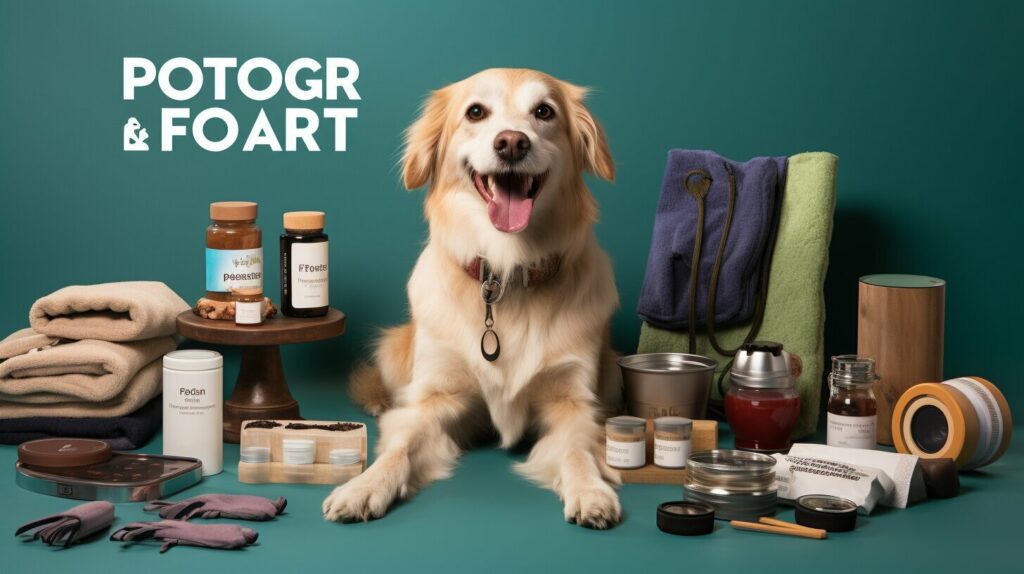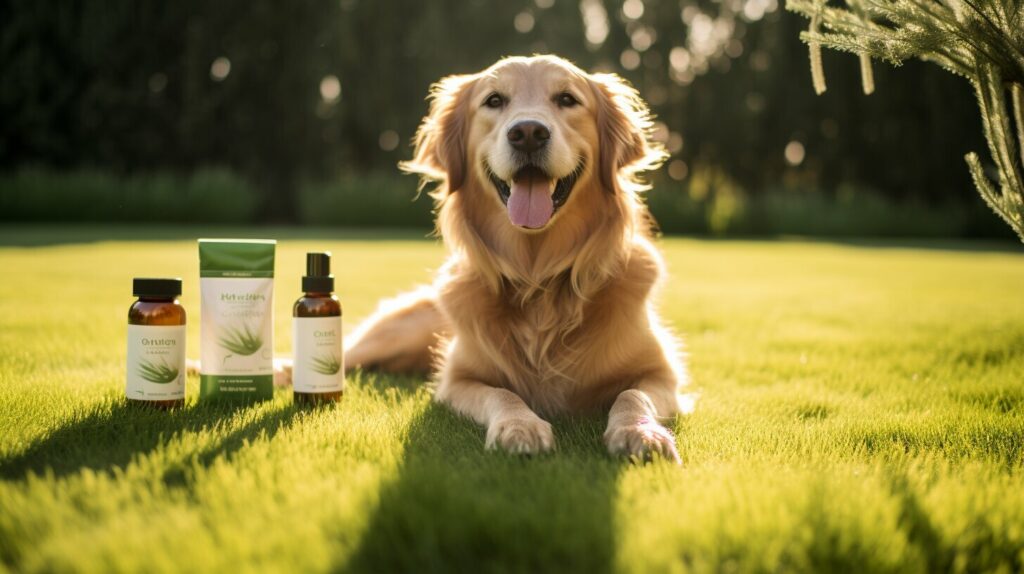As a dog owner, you want to give your furry friend the best possible care, from regular vet check-ups to nutritious food. But have you considered the role that probiotics can play in your dog’s overall health and well-being? Probiotics are live microorganisms that can provide numerous benefits, including improved digestion and a strengthened immune system. By incorporating probiotics into your dog’s diet, you can help them live a longer, happier life.
Key Takeaways:
- Probiotics are live microorganisms that can provide numerous benefits for your dog’s health.
- By improving digestion and strengthening the immune system, probiotics can help dogs live a longer, healthier life.
Understanding Probiotics for Dogs
If you’re a dog owner, you’ve likely heard about probiotics for dogs. But what exactly are they, and how can they benefit your furry friend?
Probiotics are live microorganisms that can provide a range of health benefits when ingested. The word “probiotic” literally means “for life,” and these beneficial bacteria and yeasts can help support a healthy gut and immune system.
For dogs, probiotics can help improve digestion, reduce inflammation, and boost overall health and well-being. They can also help alleviate certain conditions, such as diarrhea, constipation, and skin allergies.
As with humans, dogs naturally have a variety of bacteria in their digestive system. However, factors such as stress, poor diet, and medication use can disrupt the balance of beneficial bacteria, leading to digestive issues and other health problems.
Canine Probiotics: What to Look For
When choosing a probiotic supplement for your dog, it’s important to look for a product specifically formulated for canines. Human probiotics may not be as effective for dogs, as they may contain different strains and amounts of bacteria.
Probiotics for dogs typically come in either powder or pill form and may contain a variety of beneficial strains, including Lactobacillus acidophilus and Bifidobacterium lactis. It’s important to read the label and choose a product with a high number of live cultures per serving to ensure maximum effectiveness.
In addition, some probiotics for dogs may also contain prebiotics, which are non-digestible fibers that can help nourish beneficial bacteria in the gut.
The Benefits of Probiotics for Dogs
If you’re a dog owner, you know that keeping your furry friend healthy and happy is a top priority. One way to help maintain your dog’s health is by incorporating probiotics into their diet. Probiotics are live bacteria and yeasts that can have many beneficial effects on your dog’s overall well-being. Here are some of the key benefits of probiotics for your dog’s health:
| Benefit | Description |
|---|---|
| Improved digestive health | Probiotics can help regulate your dog’s digestive system and prevent issues such as diarrhea and constipation. They can also improve nutrient absorption, leading to better overall health. |
| Stronger immune system | Probiotics can help strengthen your dog’s immune system, making them less susceptible to illnesses and infections. This is especially important for older dogs and those with weakened immune systems. |
| Reduced inflammation | Probiotics can help reduce inflammation in your dog’s body, which can lead to a range of health issues. This can be particularly beneficial for dogs with arthritis or other inflammatory conditions. |
| Healthier skin and coat | Probiotics can help improve your dog’s skin and coat health, reducing issues such as dryness, itching, and flakiness. This can also lead to a shinier coat and less shedding. |
Overall, incorporating probiotics into your dog’s diet can have a range of benefits for their health and well-being. However, it’s important to choose the right probiotics for your dog and to consult with your veterinarian before starting any new supplements. With the right probiotics and proper care, you can help keep your furry friend healthy and happy for years to come.
Choosing the Best Probiotics for Dogs
When it comes to choosing the best probiotics for your dog, there are a few key factors to consider.
Consult with Your Veterinarian First
Before you make any changes to your dog’s diet or supplement routine, it is important to consult with your veterinarian. They can help you determine if probiotics are the right choice for your dog, as well as recommend specific brands or types based on your dog’s individual needs.
Look for Probiotics with Specific Strains
Not all probiotics are created equal, and different strains can have different benefits for your dog. Look for probiotics that contain specific strains, such as Lactobacillus acidophilus or Bifidobacterium lactis, which have been shown to support digestive health and boost the immune system.
Consider the Form of the Probiotic
Probiotics come in a variety of forms, including powders, capsules, and chewable tablets. Consider which form will be easiest for your dog to consume and which will provide the most consistent dosage.
Check for Additional Ingredients
Some probiotics may contain additional ingredients, such as prebiotics or enzymes, which can enhance their effectiveness. Look for probiotics that have added ingredients that are specifically tailored to your dog’s health needs.
Read Reviews and Recommendations
Do your research and read reviews from other pet owners to get a sense of which probiotics have worked well for their dogs. You can also ask for recommendations from your veterinarian, dog trainer, or other pet professionals.
By taking the time to choose the right probiotics for your dog, you can help support their overall health and well-being.
Natural Probiotics for Dogs: A Healthy Alternative
If you’re considering probiotics to support your dog’s health, you may be wondering whether to choose synthetic or natural sources. Natural probiotics for dogs can provide a variety of benefits, such as improved digestion and immune system support, without the potential risks associated with synthetic options.
One of the most popular natural sources of probiotics for dogs is yogurt, which contains live cultures that can aid in digestion and promote the growth of healthy gut bacteria. Other natural sources include kefir, fermented vegetables, and certain types of cheese.
When choosing natural probiotics for dogs, it’s important to consider the quality of the source and the presence of any potential allergens or toxins. Organic, non-GMO options are often a good choice, as well as those free from artificial additives or preservatives.
It’s also important to note that while natural probiotics for dogs can provide many benefits, they may not be as potent as synthetic options. In some cases, a combination of natural and synthetic probiotics may be the most effective way to support your dog’s overall health.
Incorporating natural probiotics into your dog’s diet can be done in a variety of ways, such as mixing yogurt into their food or serving fermented vegetables as a healthy snack. Always start with small amounts and monitor your dog’s reaction, gradually increasing the dosage as needed.
Remember, before making any changes to your dog’s diet or supplement routine, it’s important to consult with your veterinarian to ensure that probiotics are a safe and appropriate choice for your furry friend.
Incorporating Probiotics Into Your Dog’s Diet
If you’re looking to improve your dog’s health, probiotics can be a great addition to their diet. Here are some practical tips for incorporating probiotics into your dog’s routine:
- Choose the right probiotic supplements: When selecting a probiotic supplement for your dog, look for one that contains a variety of different strains of bacteria, including both lactobacillus and bifidobacterium. It’s also important to choose a high-quality supplement from a reputable manufacturer.
- Introduce probiotics gradually: If your dog is new to probiotics, it’s best to introduce them gradually to avoid any digestive upset. Start with a small amount and gradually increase the dosage over time.
- Add probiotic-rich foods to your dog’s diet: Many natural foods are rich in probiotics, including yogurt, kefir, and fermented vegetables. You can add these foods to your dog’s diet in small amounts to help boost their probiotic intake.
- Avoid processed foods: Highly processed foods can disrupt your dog’s gut health and make it harder for probiotics to take effect. Try to feed your dog a diet that’s rich in natural, whole foods to support their overall health.
- Consult with your vet: While probiotics are generally considered safe for dogs, it’s always a good idea to consult with your vet before making any major changes to your dog’s diet or supplement routine.
By following these tips, you can help support your dog’s digestive health and overall well-being with probiotics.
Potential Side Effects and Risks of Probiotics for Dogs
While probiotics can have many benefits for dogs, it is important to be aware of potential side effects and risks before introducing them into your pet’s routine.
Some dogs may experience digestive upset, such as diarrhea or vomiting, when first starting probiotics. This is typically a temporary side effect and should subside within a few days.
In rare cases, dogs may have an allergic reaction to certain probiotic strains or ingredients. Signs of an allergic reaction can include itching, swelling, and difficulty breathing. If you notice any of these symptoms, stop giving your dog the probiotics immediately and consult with your veterinarian.
It is also possible for probiotics to interact with certain medications or supplements your dog may be taking. Always consult with your veterinarian before starting any new supplements, especially if your dog has a pre-existing medical condition.
While the risks associated with probiotics for dogs are generally low, it is still important to approach them with caution and carefully monitor your pet’s response. With proper guidance and supervision, probiotics can be a safe and effective way to support your dog’s overall health.
Frequently Asked Questions About Probiotics for Dogs
If you’re considering giving your dog probiotics, you likely have some questions. Here are some commonly asked questions and their answers:
Q: What are probiotics and how do they work?
A: Probiotics are live microorganisms that can have health benefits when consumed in the proper amounts. They work by promoting a healthy balance of bacteria in the gut, which can aid in digestion and boost the immune system.
Q: Why should I give my dog probiotics?
A: Probiotics can provide numerous health benefits for dogs, including better digestion, improved immune system function, and reduced risk of certain illnesses. They can also help alleviate symptoms of digestive issues such as diarrhea and constipation.
Q: What kinds of probiotics are safe for dogs?
A: Generally, probiotics that are safe for humans are also safe for dogs. However, it’s important to choose a probiotic specifically formulated for dogs, as they have different needs than humans. Look for probiotics that contain canine-specific strains of bacteria and that are free from artificial sweeteners and preservatives.
Q: How do I give my dog probiotics?
A: There are several ways to give probiotics to your dog, including through supplements, specially formulated dog foods, or even natural sources like yogurt or kefir. Your veterinarian can help you determine the best method for your dog.
Q: Can probiotics have any negative side effects?
A: While probiotics are generally safe, they can cause some mild side effects such as gas or bloating. It’s important to start with a small dose and gradually increase over time to allow your dog’s digestive system to adjust. Always consult with your veterinarian before starting your dog on any new supplements.
Q: How long should I give my dog probiotics?
A: The length of time you should give your dog probiotics depends on their individual needs. Some dogs may only need a short-term course of probiotics to address a specific issue, while others may benefit from long-term supplementation. Your veterinarian can help you determine the appropriate duration.
By incorporating probiotics into your dog’s routine, you can help support their overall health and well-being. Consult with your veterinarian to determine the best probiotic options for your furry friend.
Real-Life Stories: Dogs Benefiting from Probiotics
Still unsure whether probiotics for dogs are worth the investment? Here are some real-life stories from dog owners who have seen remarkable improvements in their pets’ health after incorporating probiotics into their daily routines.
“My dog, Max, used to suffer from constant stomach issues, including diarrhea and vomiting. We tried everything, but nothing seemed to work until we started giving him probiotics. Since then, he hasn’t had a single stomach issue, and his coat is shinier than ever!” – Sarah M.
“My French Bulldog, Bella, has always had a weak immune system and would get sick often. After talking to our veterinarian, we decided to try probiotics, and it’s made a huge difference. She’s now able to fight off illnesses much better, and her overall energy has improved.” – Mark R.
“Our rescue dog, Charlie, had terrible breath and would occasionally develop skin irritations. We started giving him a probiotic supplement, and it’s been a game-changer. His breath is much fresher, and his skin is now clear and healthy.” – Lisa J.
These are just a few examples of how probiotics can benefit dogs. If you’re considering adding probiotics to your dog’s routine, talk to your veterinarian to determine the best course of action.
Conclusion
In conclusion, probiotics can have a significant impact on your dog’s overall health and well-being. By incorporating probiotics into your dog’s diet, you can help improve their digestion, strengthen their immune system, and even aid in weight management. When choosing the right probiotics for your dog, be sure to consider factors such as the type of probiotic strain and the form in which it is administered. Additionally, it’s important to consult with your veterinarian before introducing any new supplements into your dog’s routine. With the right probiotics and proper guidance, you can help unlock your dog’s full health potential and keep them happy and healthy for years to come. So, go ahead and give your furry friend the probiotics they need to thrive.
FAQ
Q: What are probiotics?
A: Probiotics are live bacteria and yeasts that are beneficial to the digestive system and overall health of dogs.
Q: How can probiotics benefit dogs?
A: Probiotics can help improve digestion, boost the immune system, and support overall gut health in dogs.
Q: How do I choose the right probiotics for my dog?
A: When selecting probiotics for your dog, consider factors such as the specific strains of bacteria, the quality of the product, and consult with your veterinarian for recommendations.
Q: Can I give my dog natural probiotics?
A: Yes, there are natural sources of probiotics for dogs, such as yogurt and fermented vegetables. These can provide a healthy alternative to synthetic probiotics.
Q: How do I incorporate probiotics into my dog’s diet?
A: You can introduce probiotics into your dog’s diet through supplements specifically formulated for dogs or by adding probiotic-rich foods to their meals.
Q: Are there any side effects or risks associated with probiotics for dogs?
A: While probiotics are generally safe for dogs, some may experience mild gastrointestinal upset. It’s important to consult with your veterinarian before starting any new supplements.
Q: What are some commonly asked questions about probiotics for dogs?
A: Some frequently asked questions include how long it takes to see results, whether probiotics are suitable for puppies, and if they can be given alongside other medications.
Q: Are there any real-life stories of dogs benefiting from probiotics?
A: Yes, many dog owners have reported positive results from incorporating probiotics into their pets’ routines, ranging from improved digestion to increased energy levels.



